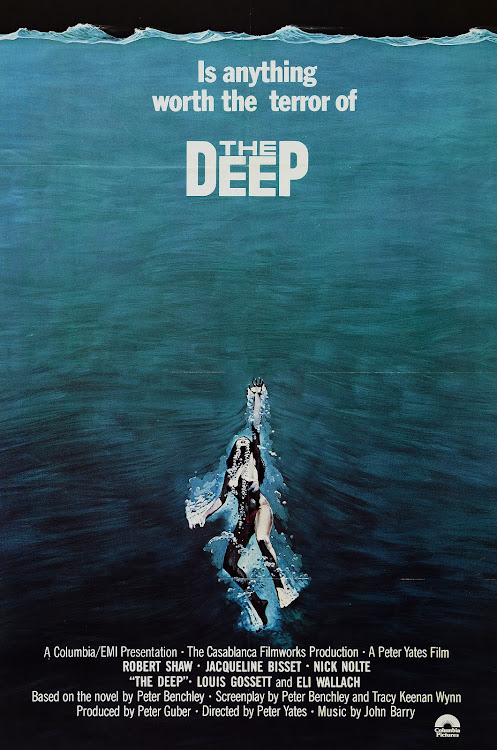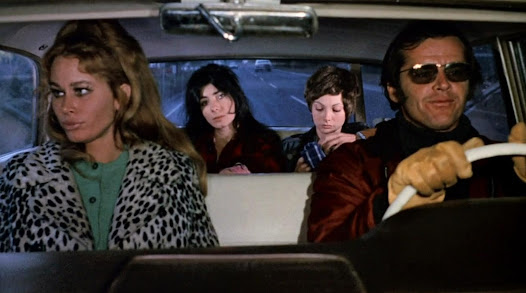Works Well with Whisky #2
WWW: Hard Times, The Deep, and Five Easy Pieces
HARD TIMES (1975) --- Walter Hill’s first go at direction, Hard Times came as indirect result of success Dillinger had for AIP a couple years before. Inexpensive action films gained currency, maybe more so, by the mid-seventies as drive-ins maintained presence even in the face of gas shortage chipping away at outdoor show-go. Extras on Eureka’s Masters of Cinema Blu-Ray give good behind-scene account courtesy Hill and producer Lawrence Gordon. They wanted and got Charles Bronson to lead, his three million tab leaving but one million to complete the film, star salaries on daily uptick by this time. Is money currently paid to known names creeping downward? Director Hill says he took advice from Raoul Walsh, Hard Times giving evidence of that, being of Depression era when more-less hobos fought bare knuck for betting spectators, illegal sport as was boxing earlier in the century, that period captured colorfully by Walsh in 1942’s Gentleman Jim. Enough of 30’s flavored New Orleans was still around in 1975 for Hard Times to score realism without spending beyond means. Bronson speaks little but conveys plenty, withholding a best policy as observed by action men. He seems to have been an odd breed of loner wolf offscreen. Few knew Bronson, fewer still understood him. Hard Times is 94 minutes ideally seen on beverage terms, ice cubes added to make a tall drink taller. Hard Times was perhaps taken for granted in its day, or lost in a shuffle of lesser Bronsons. Those who went were gratified and would remember how good Hard Times was, and still is. The Eureka Blu rewards for not only extras, but being region-free.
THE DEEP (1977) --- I'd not cover 1977 in laurel, though others (many) will call it cinema’s banner year for bestowing Star Wars, if little else. Revisit to some dismissed then can seem tastier now, for instance The Deep, welcome to spirits gather where beverage goes down smoother than seawater Nick Nolte, Jacqueline Bisset, and Robert Shaw got gulps of. That man Shaw led us to figure The Deep for more sharking after Jaws model, ’77 a year when nature ran roughshod over man, no trip to the College Park complete without whales, grizzlies, what not, feeding upon hapless humanity. Were we really afraid to go into water after Jaws? As I recall, yes. Not much liking the ocean anyhow on theory that if you can’t see your feet, stay out, and not living near the shore besides, it was preferred (by me) to stay safe in chlorinated pools. Yes, The Deep had sharks, and TV spots emphasized them, plus Shaw doing his Quintish thing.
Also upon front burner was Bisset submerged in a T-shirt that sold at least as many tickets as any aspect of The Deep, viewers sated by that spectacle in an opener dive sequence that is not repeated, sort of like Hitchcock cameos, as in give them what they’re waiting for early so they can concentrate on narrative after. The Deep tells a good story by Peter Benchley, who also wrote Jaws, his a gilt-edged bestest seller for run-up year to The Deep, elements in place to secure lush-for-then $47 million. The Deep was of “Blockbuster” bent, such the H’wood mentality since Jaws led ways. Five months were spent making it, underwater effect like none achieved before, the more impressive for stars doing their own jumps overboard. CBS hosted an hourlong special on the ordeal narrated by Robert Shaw, a bonus with the Blu-Ray, and enjoyable. The network also broadcast a three hour “expanded” version of the feature, from which a number of scenes augment the Blu-Ray. I watched all this stuff and came away with belated regard for a show I took for granted when it was new. By all means, see it with libation you love.
FIVE EASY PIECES (1970) --- It matters a lot when/where we first see a particular film. Five Easy Pieces in 1970 was so far past my level of maturity as to speak foreign tongue. Why was I even at the Liberty for such a thing? Best recollection is some of us from Youth Group driving down from Sunday evening meet for the 7 PM show, not particular as to what was playing and knowing barely what Five Easy Pieces was (we would attend Doctor’s Wives for similar obscure purpose). Being sixteen and recipient of license to drive plus access to screen alphabet generous in R and M (ratings), I figured Five Easy Pieces for fruit once forbidden and no longer so. Even bad movies were saved by the seventies thanks to content unseen hitherto but welcome, nudity a preferred option but violence and language OK too. Criterion for its laudable Blu-Ray called Five Easy Pieces “searing” and “a lasting example of early 1970’s American alienation,” response alien to me for what was I then alienated from apart from aspects of school and the fact Castle of Frankenstein wasn’t being published more regularly? Did we realize an “Era of Discontent” had engulfed us? Shield that was ongoing childishness protected me like Perseus from Medusa. Changes many call convulsive barely if at all made contact, my life experience as of then limited and conception of changes narrow beside those markedly altered by them. Off the hook for Viet Nam thanks to tender age, I might have wondered how Nicholson’s Bobby Dupea got round the draft.
Being adrift among working folk despite his own educated background raises current question as to why Bobby hangs with class inferiors. Was he slumming in ways not unlike Godfrey Powell buttling to the rich without telling them he is also rich? Bobby sort of wants things both ways and maybe that is his principal trouble. He attacks and insults invited guests to his father’s home where Bobby shares duty as host, a same sort of insufferable rudeness exhibited by K. Hepburn as Linda Seton targeting visitor relatives in Holiday. Why do such scenes strike me as sop to a then-audience themselves inclined to be obnoxious? The chicken sandwich order is more along such line, celebrated in ’70 till real-life servers got a glimpse and excoriated filmmakers for making Bobby the up-yours victor, but wasn’t this just lashing out at a worker class he sees as beneath him? Such wrinkles enrich Five Easy Pieces and keep it fresh after half a century. Bobby hitching aboard a truck in the final scene rings accurate as to resort a man might take given same circumstance. Was this ending what seared so in 1970?










2 Comments:
It's been many years since I've watched "Five Easy Pieces"; I remember thinking that the character Nicholson portrays wasn't very likable - at least I found him so - and remembered thinking that he ended up where he deserved to; having defined himself entirely by his opposition to his father, when his father died he entirely lost his bearings and became truly aimless. A warning about defining oneself solely by what one opposes, I thought. I ought to re-watch it, it has been a long time.
I first saw "Hard Times" when a couple of our acquaintance, who had been amongst those at our "dinner and a movie" get-together when we first showed-off our new projector and screen, came for dinner on a later occasion and presented us with a DVD of this film, to watch after dinner.
I was unfamiliar with it; but our guest insisted "Hard Times" was "the best movie ever made" (his wife was rolling her eyes in the background at this point).
It is an enjoyable movie - and Strother Martin has been good in every thing I've seen him in, this being no exception - but my friend's opinion reminded me how personal these sorts of judgments are.
"The Deep" I've not seen.
For some reason, "Hard Times" was renamed "The Streetfighter" in the UK.
Post a Comment
<< Home